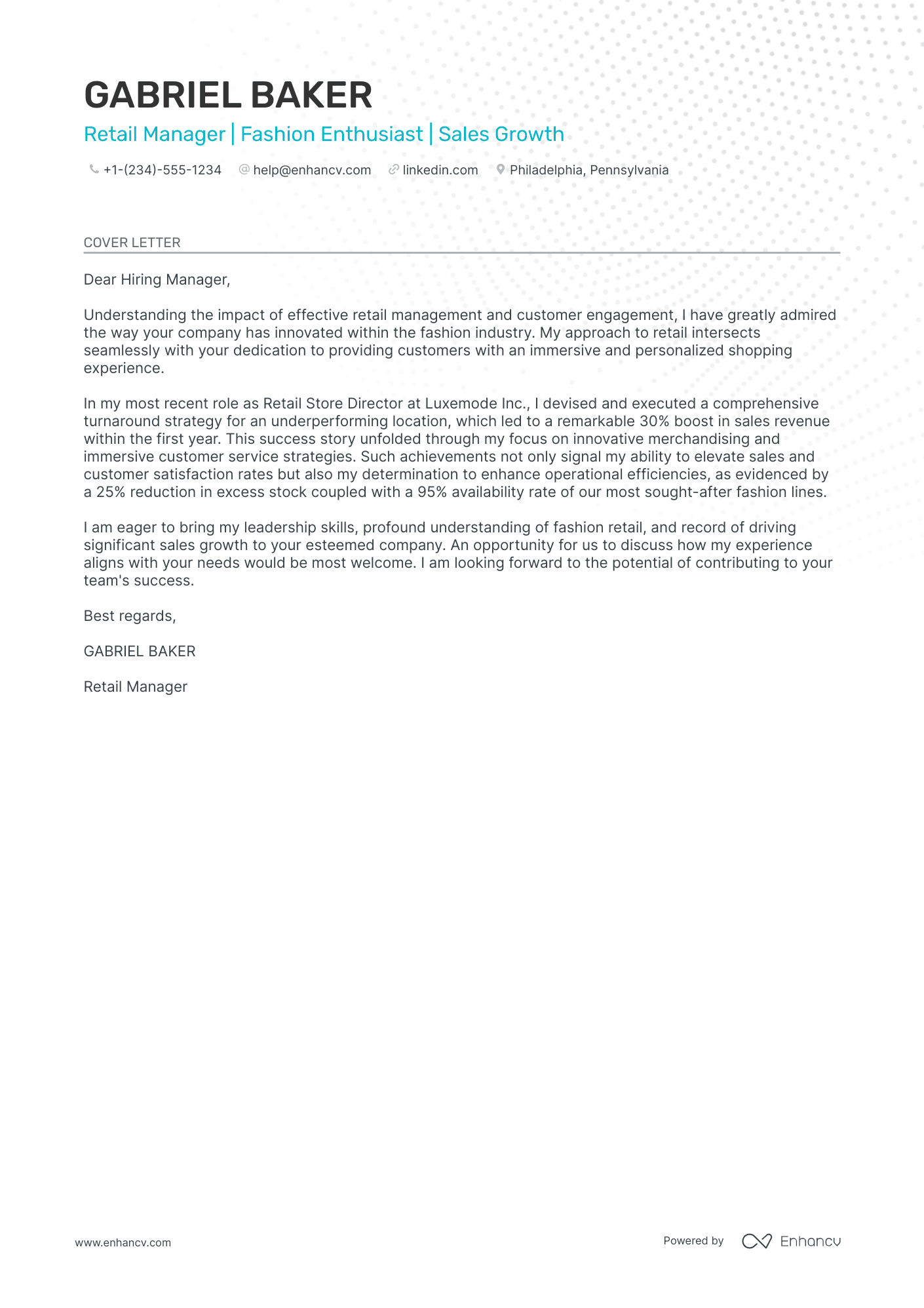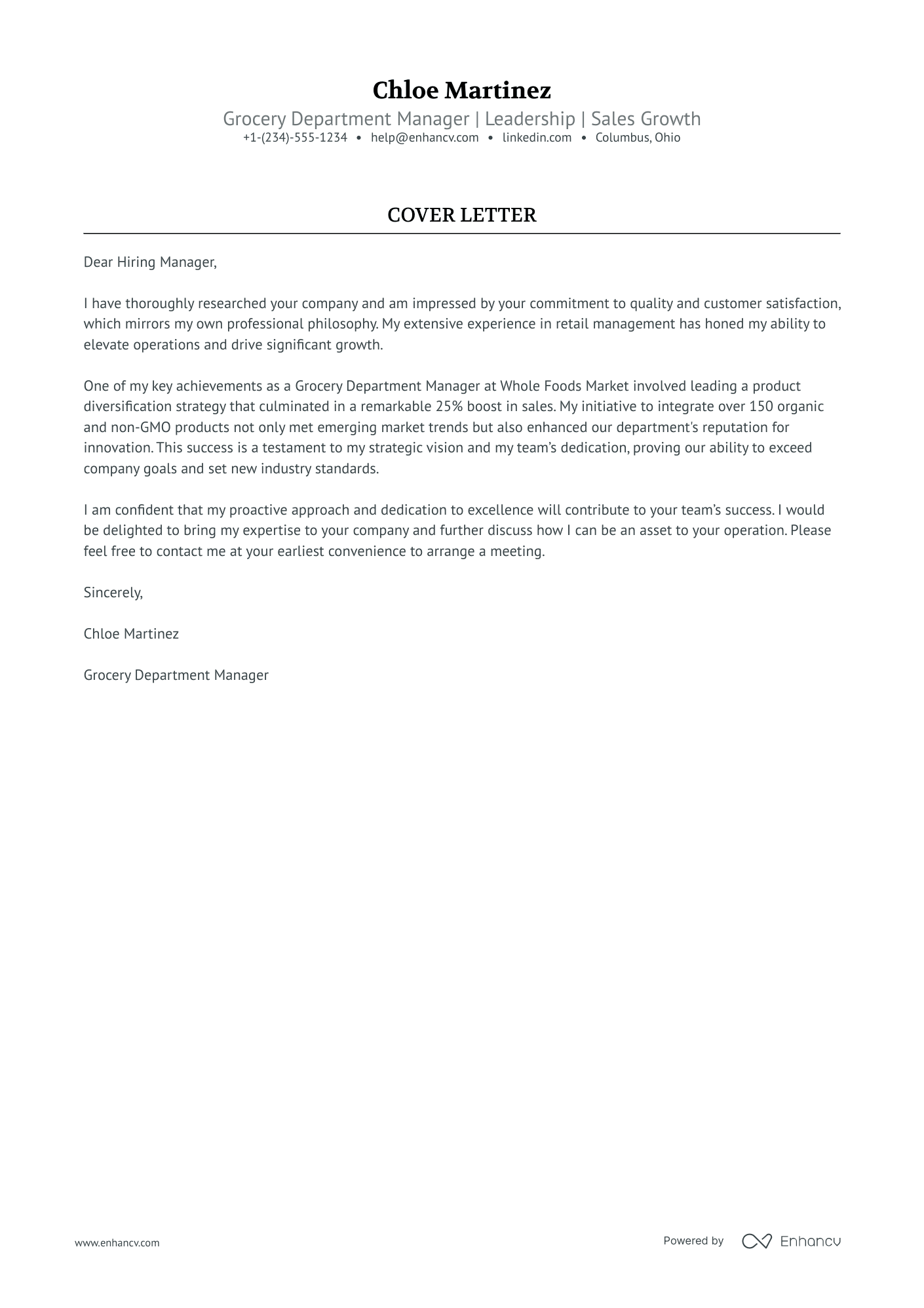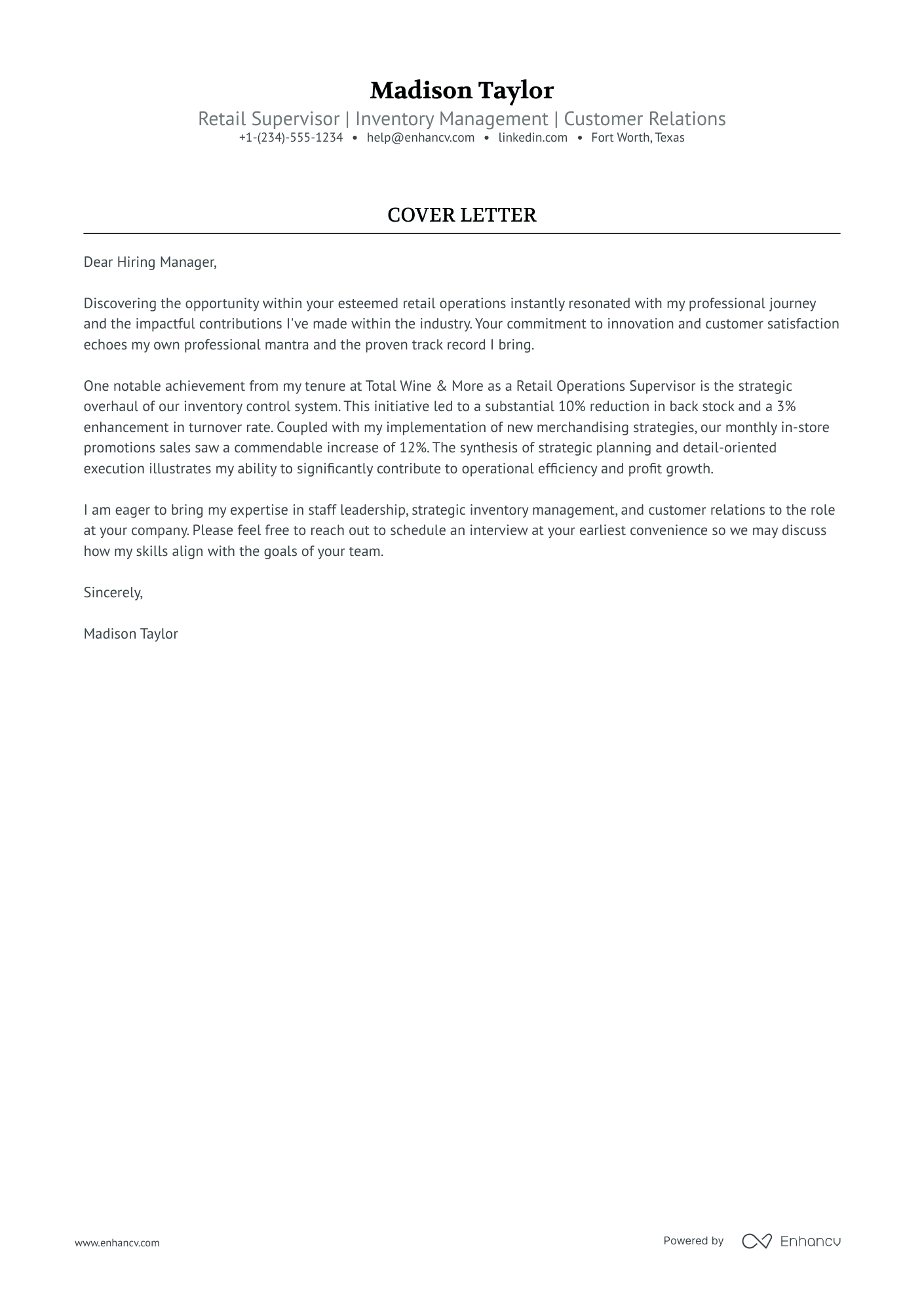Crafting a compelling store manager cover letter can be a baffling task as you step into the job market. You know it's a golden ticket to complement your resume, yet the pitfall of simply echoing it looms large. Instead, zoom in on your crowning professional moment; this isn't the time for clichés but for showcasing your unique success story. And remember, brevity is king—a single page should capture and keep the hiring manager's attention. Let's dive into making every word count.
- Some inspiration from other professionals' job-winning cover letters;
- The best structure and format for your store manager cover letter;
- Insights on how to write about your best achievement to stand out;
- A creative twist on your store manager cover letter intro.
Upload your store manager resume to Enhancv's AI, which will quickly scan and prepare a job-winning cover letter for you.
If the store manager isn't exactly the one you're looking for we have a plethora of cover letter examples for jobs like this one:
Drop your resume here or choose a file.
PDF & DOCX only. Max 2MB file size.
Store manager cover letter example
Alex Johnson
San Francisco, CA
+1-(234)-555-1234
help@enhancv.com
- Demonstrates specific achievements with quantifiable results, such as a "25% year-over-year sales growth," which shows the applicant's ability to significantly impact sales, a key metric for a Store Manager role.
- Highlights leadership and the ability to drive team improvements by mentioning the development of "a rigorous training program," which shows the candidate's focus on team development and sales improvement strategies.
- Expresses eagerness to face new challenges and capitalize on opportunities, suggesting a proactive and driven personality suited for a dynamic retail environment.
- Customizes the letter to the potential employer by stating a desire to contribute to the "continued success and growth" of their store, demonstrating a direct interest in the specific company's well-being.
What should your store manager cover letter look like - formatting and organizing your information
Have you ever wondered what are the must-have sections you need to include in your store manager cover letter? Our builder sets those up for you with:
- Header - dedicated to your contact information, the role you're applying for, and the date (don't forget to include your name);
- Greeting and opening paragraph - to create a personalized and memorable experience for recruiters;
- Body paragraph - emphasizing your skill set and knowledge that aligns with the role and helps you to stand out;
- Closing paragraph - leaving a great impression and ending with an optional signature.
Use a cover letter template to discover the best formatting for your store manager cover letter: that is single-spaced paragraphs and wrapping your content in a one-inch margin.
Ensure that both your resume and store manager cover letter are in the same font. Stand apart from the crowd by using modern, yet simple fonts, like Chivo and Rubik, instead of the overused Arial and Times New Roman.
Did you know that the Applicant Tracker System (or ATS) won't be assessing your store manager cover letter? Instead, submit your profile in PDF to recruiters to keep the same formatting and the design intact.
Overwhelmed by cover letters? Our free cover letter generator lets you make one in seconds based on your resume.
The top sections on a store manager cover letter
- Header: Include your contact information and the date, which is essential for the recruiter to know who you are and how to reach you.
- Greeting: Address the hiring manager or recruiter by name if possible, to personalize your cover letter and show attention to detail.
- Introduction: Briefly highlight your interest in the store manager position and your relevant experience to capture the recruiter's interest immediately.
- Body: Discuss specific experiences that demonstrate your skills in retail management, leadership, merchandising, and customer service, which are crucial competencies for a store manager.
- Closing: Reiterate your enthusiasm for the role, invite the recruiter to review your attached resume, and suggest a follow-up meeting, showing your proactive approach and strong communication skills.
Key qualities recruiters search for in a candidate’s cover letter
- Proven leadership and team management skills: Crucial for directing store operations and leading staff toward achieving sales targets and maintaining high customer service standards.
- Retail industry experience: Indicates familiarity with retail environments, customer service, inventory management, and visual merchandising, which are essential components of store management.
- Strong communication and interpersonal abilities: Vital for effectively interacting with customers, staff, and upper management, as well as resolving conflicts and providing clear instructions.
- Sales proficiency and target orientation: Reflects the ability to drive sales growth, meet or exceed sales goals, and develop strategies to improve sales performance.
- Budgeting and financial acumen: Necessary for managing store expenses, analyzing financial data, and optimizing profitability.
- Decision-making and problem-solving skills: Important for making informed decisions on a daily basis and addressing any challenges that arise in store operations.
The store manager cover letter salutation: how to address hiring managers
After covering the format of your store manager cover letter, let's look at the salutation.
Back in the day, the cordial "To whom it may concern" or "Dear Sir/Madam", might have worked out fine.
But, nowadays, your cover letter should approach hiring managers on a more personal basis.
So, what to do about your cover letter salutation?
If you've messaged the recruiters and are on a first name basis or a more formal one, use the hiring manager's name in the greeting (e.g. "Dear Sophie," "Dear Ms. Givens", or "Dear Mr. Everett,").
Always aim to make the effort to find out the name of the hiring manager, who'd be assessing your application. Search on LinkedIn, double-check the advert on the corporate website, or message the brand on social media to find out more about the role.
If you can't find the hiring manager's name (and still want to sound professional), use "Dear HR Team,", "Dear Hiring Manager,", or the likes.
List of salutations you can use
- Dear Hiring Manager,
- Dear [Company Name] Team,
- Dear [Department] Hiring Committee,
- Dear Mr./Ms. [Last Name],
- Dear Dr. [Last Name],
Your store manager cover letter introduction and the value you bring
Moving on from the "Dear Recruiter" to your professional introduction.
Use those first two sentences of your store manager cover letter to present the biggest asset you'd bring to the organization.
Don't go into too much detail about your achievement or the skill set, but instead - go straight for the win.
That is - what is your value as a professional?
Would you be able to build stronger, professional relationships in any type of communication? Or, potentially, integrate seamlessly into the team?
How to write an achievement-focused store manager cover letter body
We've got the intro and greeting covered. Now, comes the most definitive part of your store manager cover letter - the body.
In the next three to six paragraphs, you'd have to answer why should recruiters hire you.
What better way to do this than by storytelling?
And, no, you don't need a "Once upon a time" or "I started from the bottom and made it to the top" career-climbing format to tell a compelling narrative.
Instead, select up to three most relevant skills for the job and look back on your resume.
Find an achievement, that you're proud of, which has taught you these three job-crucial skills.
Quantify your accomplishment, using metrics, and be succinct in the way you describe it.
The ultimate aim would be to show recruiters how this particular success has built up your experience to become an invaluable candidate.
Two ideas on how to end the final paragraph of your store manager cover letter
Closing your store manager cover letter, you want to leave a memorable impression on recruiters, that you're a responsible professional.
End your cover letter with how you envision your growth, as part of the company. Make realistic promises on what you plan to achieve, potentially, in the next six months to a year.
Before your signature, you could also signal hiring managers that you're available for the next steps. Or, a follow-up call, during which you could further clarify your experience or professional value.
Lacking experience: here's how to write your store manager cover letter
As a candidate with no experience, it's important to be honest from the get-go of your application.
Use your store manager cover letter to sell your unique talents. Choose an accomplishment from your academic background or your volunteer work to show the skills that are relevant to the role.
Focus on your career objectives and how you see the job to align with them. Be specific and, at the same time, realistic about where you picture yourself in five years.
Key takeaways
Turning your store manager cover letter into a success is all about staying authentic to yourself and relevant to the job:
- Be creative with your store manager cover letter introduction by stating something you enjoy about the company (that is genuine) or about your skill set (to get the recruiters' interested);
- Use single spacing and have a one-inch margin wrapping all around the content of your store manager cover letter;
- Select just one past achievement from your career or life to tell a story of how you've obtained job-crucial skills and how they'd be beneficial to the role;
- The finishing paragraph of your store manager cover letter doesn't necessarily have to be a signature but could be a promise of what you plan to achieve in the role;
- Instead of focusing on your lack of experience, spotlight your transferable skills, one relevant achievement, and career dreams.
Store Manager cover letter examples
By Role







